新概念英语53课讲义.doc
新概念英语第二册:第53课课文详解及语法解析

【导语】新概念英语⽂章短⼩精悍,语句幽默诙谐,语法全⾯系统。
适合各个阶层的⼈群学习参考。
相信有了新概念英语,你也可以成为“⼤神”级别的⼈物!还在等什么?快来加⼊学习吧!⼩编与您⼀起学习进步! 课⽂详注 Further notes on the text 1.At last firemen have put out a big forest fire in California.消防队员们终于扑灭了加利福尼亚的⼀场森林⼤⽕。
(1)at last(终于,到底)表⽰经过⼀番努⼒之后。
(2)put out可以表⽰“扑灭”、“熄灭”、“关掉”等含义: Please put the light/ fire out. 请把灯关掉/把⽕灭掉。
(3)forest虽然是名词,但在句中起形容词的作⽤,修饰fire。
2.…they have been trying to find out how the fire began.……他们⼀直试图找出起⽕的原因。
(1)短语动词find out表⽰经过研究、努⼒等“发现”、“找出”、“查出”: I'll try and find out the name of the person who saved my life yesterday. 我将设法查出昨天救我命的那个⼈的姓名。
(2)how the fire began是find out的宾语,它是⼀个由疑问词how引导的名词从句。
3.They were also quite sure that a cigarette end did not start the fire.他们还⼗分肯定⽕灾也不是由烟头引起的。
(1)start作及物动词时可以表⽰“使……发⽣”、“引起”。
(2)be sure后⾯跟的是名词从句。
that引导的这个名词从句也可以写成that the fire was not started by a cigarette end。
新概念第一册第53-54课课件

循序渐进
教材按照由浅入深、循序渐进的原则编排, 适合不同水平的英语学习者。
综合训练
通过听、说、读、写等多种训练方式,全面 提高学习者的英语能力。
第53-54课内容概述
01
02
03
课文主题
介绍两位著名人物及其成 就。
语言点
本课涉及一些新的词汇和 表达方式,如“be known as”、“make a contribution to”等。
02
03
自由表达
提供主题或话题,让学生自由发 挥,进行口语表达练习,培养他 们的思维能力和创造力。
04
06
阅读理解与写作技能提升
相关主题文章阅读推荐
经典童话故事
选择适合学生年龄段的经典童话故事,如《小红帽》、《灰姑娘》 等,通过阅读这些故事,培养学生的阅读兴趣和理解能力。
生活类短文
选取与学生日常生活相关的短文,如学校生活、家庭生活、朋友相 处等,引导学生将阅读与生活实际相结合,提高阅读实用性。
等。
02
社交习惯差异
探讨中西方在社交习惯方面的不同,如问候方式、称呼方式、送礼习俗
等。
03
时间观念差异
分析中西方在时间观念上的差异,如守时与灵活、计划性与随机性等。
跨文化交际能力培养
语言交际能力
提高英语听说读写能力,培养用英语进行日常交际和跨文 化交际的能力。
文化适应能力
增强对不同文化背景下行为规范的认知和适应能力,避免 文化冲突和误解。
句子结构分析及语法点讲解
简单句和复合句
定语从句
本课课文中出现多种句型,包括简单 句和复合句。简单句由一个主语和一 个谓语构成,而复合句则包含一个主 句和一个或多个从句。
新概念第二册_lesson_53课件
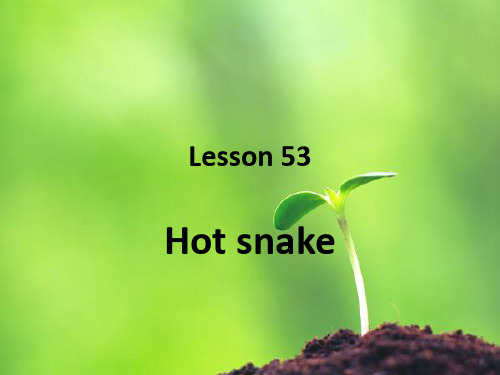
Let’s draw some pictures
本课所需掌握词组: put out in this way since then solve the mystery find out snatch up throw away Throw about
Throw at Throw to
随处扔 扔向(有目标性) 扔向(无目标性)
★ wire • n. 金属线,电线 • telephone wires 电话线 • Electric wires 电线 • wireless adj. 无线的 • wireless telegraphy 无线电报 ★volt n. 伏特
• • • • • • •
solve v. 解决,解答,回答 =work out 解决问题 solve a problem 解开谜团 solve a mystery 我们必须解决经济危机。 We must solve the economic crisis.
那人抓起她的钱包就跑。(强调动作很快很猛) drop & fall a. drop 表示 “使落下、使掉落”,是及物动词, 带宾语: He dropped the bag. b. fall 表示 “掉下、跌倒”,是不及物动词,不能带宾 语。 He fell down the stairs and broke his leg.
• • • • • • •
snatch v. 抢,夺,掠取 snatch up 抓起来 贼把她的包抓起来逃跑了。 The thief snatched her bag and ran away. 在他妈妈刚要看那张纸的时候,他把它夺走了。 He snatched the paper as his mother was about to see it.
新概念一册53课经典课件

south S
North
West
East
South
northeast n. 东北方 northwest n. 西北方 Southeast n. 东南方 Southwest n. 西南方
season n.季节
• eg: There are four seasons all over the year. • 一年有四季。 • • • • spring 春季 summer 夏季 autumn/fall 秋季 winter 冬季
• dialogue是对话,必须有两个人在互相说 话,一般是书面语;
• talk可以是任何形式的说话,一个人对一 群人的讲话也可以用talk; • conversation是一个人以上的说话,一般 是讨论一个主题;
• chat是聊天,不一定有个主题,就是随便 说话(比如网上聊天)
mild It’s _______, but it’s not always pleasant _______. 气候温和,但也不总是宜人的。
rise 升起 —— set 落下
• sunrise 日出 • sunset 日落
• eg: The sun rises in east and sets in west. 太阳东边升西边落。
rise
v.升起
• rise是“上升,上涨,起床,站立” 的意思。该词为不及物动词, • raise v. 举起raise用作及物动词, 其基本含义是“使升起来,举起” • 1.The sun rises in the east .日出 于东方。 • 2.His speech raised my interest. 他的发言激起了我的兴趣。
night 夜晚
• • • • • at night 在晚上 good night 晚安 in the morning 在早上 in the afternoon 在下午 in the evening 在晚上
新概念英语第三册53课时
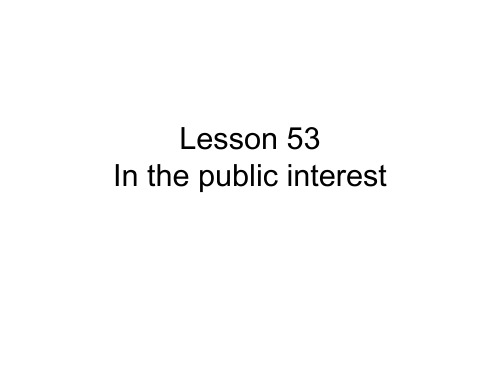
• Change of habit cannot alter Nature. • 改变习惯却不能改变天性。
• Alter ideas and you alter the world. • 适应这个社会的最实际的办法就是改变你
自己。 • The best approach to adapt the society is
Ascertain 确定 Assure 保证 Assert 断定 Assess 评价 Assume 假定
• Deal roughly with sb. 粗暴的对待某人 • Be crude to sb. • Be rude to sb. • Treat sb. Roughly
• Take freedoms with sb. 对某人放肆 • Treat sb. With abandon 对某人无礼 • Knock around sb. 虐待某人
Evolve 进化形成 Generate 产生 Engender 产生 Develop 培养 Breed 培育 Foster 抚育
• 著名科学家袁隆平先生一生 致力于培育新的水稻品种, 在实践基础上形成了他的农 业理论,让我们的国家生产 了更多的粮食抚育了大量的 人口。
• Yuan Long Ping, a famous agricultural scientist, puts his heart into breeding new kinds of race, which developed his unique theory to make it possible for our country to produce more food to foster lots of population.
当的;无力的 • n. 无能力者 • He is a incompetent official.
新概念第一册第53课

主语+谓语+间接宾语+直接宾语(SVOi…
句子中包含两个宾语,间接宾语通常表示人,直接宾语表示物。
并列句和复合句应用
并列句
由并列连词连接的两个或两个以上的 简单句构成,各分句之间地位平等, 没有从属关系。
并列句与复合句的转换
通过添加从属连词或将并列连词替换 为从属连词,可以将并列句转换为复 合句,或将复合句拆分为并列句。
情态动词must和have to的用法区别 :must表示主观上的必须,而have to表示客观上的必须。
反身代词的用法:反身代词通常与动 词连用,表示动作作用于主语本身。
04 听力技巧与训练 建议
听力材料选择策略
01
02
03
选择真实场景对话
优先选择日常生活、学习 、工作中的真实对话,以 便更好地理解和运用语言 。
比……有优势,用于比较两个或多个事物之 间的优劣。
a great deal of
大量的,用于修饰不可数名词,表示数量很 多。
take part in
参加,指加入某种活动或组织中。
be successful in
在……方面成功,用于描述在某方面取得成 功的情况。
拓展词汇及表达方式
benefit
利益、好处,与 `advantage`意思相 近,但更强调获得的 实际利益。
复合句
由一个主句和一个或一个以上的从句 构成,从句在句中作主句的某个成分 ,从句与主句之间有从属关系。
重点语法点剖析
现在完成时态:表示过去发生的动作 对现在造成的影响或结果,常与 already,yet,just等副词连用。
感叹句的构成及用法:通过将主语和 谓语颠倒顺序并在前面加上感叹词 what或how来构成感叹句,表达强 烈的感情。
新概念第一册精讲第53课:有趣的气候 An interesting climate
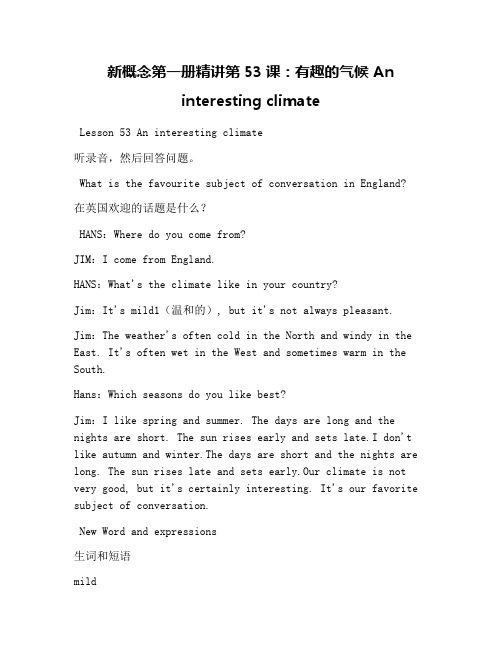
新概念第一册精讲第53课:有趣的气候 Aninteresting climateLesson 53 An interesting climate听录音,然后回答问题。
What is the favourite subject of conversation in England?在英国欢迎的话题是什么?HANS:Where do you come from?JIM:I come from England.HANS:What's the climate like in your country?Jim:It's mild1(温和的), but it's not always pleasant.Jim:The weather's often cold in the North and windy in the East. It's often wet in the West and sometimes warm in the South.Hans:Which seasons do you like best?Jim:I like spring and summer. The days are long and the nights are short. The sun rises early and sets late.I don't like autumn and winter.The days are short and the nights are long. The sun rises late and sets early.Our climate is not very good, but it's certainly interesting. It's our favorite subject of conversation.New Word and expressions生词和短语mildadj. 温和的,温暖的alwaysadv. 总是northn. 北方eastn. 东方wetadj. 潮湿的westn. 西方southn. 南方seasonn. 季节bestadv. 最nightn. 夜晚risev. 升起earlyadv. 早setv. (太阳)落下去lateadv. 晚,迟interestingadj. 有趣的,有意思的subjectn. 话题conversationn. 谈话参考译文汉斯:你是哪国人?吉姆:我是英国人。
新概念英语第二册+Lesson+53+Hot+snake+详解讲义

新概念2 第53课…a fireman accidentally discovered the cause.……一个消防队员偶然发现了起火的原因。
discover本身含有偶然发现(某个已经存在的东西)的含义:I don't know who discovered America. 我不知道谁发现美洲的。
在discover前面加上accidentally更加强了“偶然”、“意外”的含义。
He noticed the remains of a snake which was wound round the electric wires of a 16,000-volt power line.他发现了缠绕在16,000伏高压线上的一条死蛇。
(1)the remains表示“尸体”、“残骸”,必须用复数形式:wound /wuːnd/为wind的过去分词。
wind在这里不表示“蜿蜒”,而表示“卷在……上”、“缠绕”,常与around/round连用:wind sth around sth 把…缠绕在…上Did you wind this piece of wire round the tree? 是你把这根铁丝缠在树上的吗?wound, n,(刀、枪或其他武器所致的)创伤,伤口;(感情或名誉的)损害,痛苦v. (武器或其他利器)伤害,使受伤;(在感情上)使受创伤.(3)wire指具体的电线、铁丝等,line在这里指“线路”,含义比wire广。
When it did so…当它这样做时……so常用于一些动词之后,代指前面提过的某个动作/某件事,以免重复. I think so.snatch , v.抢,夺,掠取. snatch up 抓起来The thief snatched her bag and ran away. 贼把她的包抓起来逃跑了。
He snatched the paper as his mother was about to see it. 在他妈妈刚要看那张纸的时候,他把它夺走了。
新概念第三册Lesson53知识讲解

Lesson52 Multiple Choice
1.a 2.c 3.d 4.b 5.c 6.d 7.b 8.a 9.c 10.d 11.a 12.d
Lesson 53 In the public interest
Ling
IN THE PUBLIC INTEREST
➢What could not be reported in the official files? The fact that the policeman was prejudiced against foreigners.
• high-handed adj.高压的,专横的 • = overbearing • e.g - 实在没有必要这样专横行事 • - There was really no need for such high-
handed behaviour.
• henpeck
• “high-” • high-born 出生高贵的 • high-class 极好的;上流社会的 • high-definition 高清晰度的;高分辨率的 • high-end 高档的 • high-flying 十分成功的 • high-level 级别高的 • high-maintenance 费神费力的 • high-minded 高尚的 • high-perfomance 高性能的
- Few people will admit to being racially prejudiced. • e.g - I think it's an excellent article, but then I'm prejudiced - I wrote it!
• prejudice n.
新概念第一册第5354课课件

语法点解析
在长难句分析中,本课还重点讲解了 相关的语法点,如从句的引导词、时 态和语态的运用等。
04
听力训练与提高
听力材料选择及播放
01
02
03
材料来源
选择真实场景对话、新闻 广播、学术讲座等多样化 听力材料。
难度分级
根据学生水平,选择不同 难度的听力材料,从简单 到复杂逐步过渡。
播放方式
通过多媒体设备播放听力 材料,确保音质清晰、速 度适中。
翻译技巧
在翻译过程中,本课强调了翻译 的准确性、流畅性和地道性,并 提供了一些实用的翻译技巧和方 法。
难点句子深入剖析
长难句分析
语境理解
本课针对课文中出现的长难句进行了 深入剖析,帮助学生理解句子结构和 含义。
除了语法点外,本课还强调了语境在 理解句子含义中的重要性,并提供了 一些实用的语境理解技巧和方法。
比较中西方在问候与告 别方面的文化差异,如 问候用语、告别方式和 时间观念等。
礼物赠送与接受
分析中西方在礼物赠送 与接受方面的不同观念 和行为习惯,如礼物的 选择、包装和赠送时机 等。
餐饮文化
探讨中西方餐饮文化的 差异,包括饮食观念、 餐桌礼仪和饮食禁忌等 方面的对比。
跨文化交际能力培养
增强文化意识
2
3
示例:句子中使用该短语的示例ຫໍສະໝຸດ 词汇记忆技巧分享技巧1
联想记忆法
描述
通过与其他事物或图像进行关联,帮助记忆词汇 。
示例
将生词与熟悉的图像或故事联系起来,形成有趣 的联想。
词汇记忆技巧分享
技巧2
词根词缀法
描述
通过分析单词的词根和词缀,理解并记忆单词的含义。
示例
新概念英语课件第三册Lesson 53In the public interest

Text
As long ago as 1809, the Swedish Parliament
introduced a scheme to safeguard the interest of the individual. launch To safeguard the fundamental interests of the overwhelming majority of the people
Text
As complaints must be made in writing, the
Ombudsman receives an average of 1200 letters a year. Receive 1200 letters a year on average
Text
He has eight lawyer assistants to help him and
新概念英语第一册第53课课件
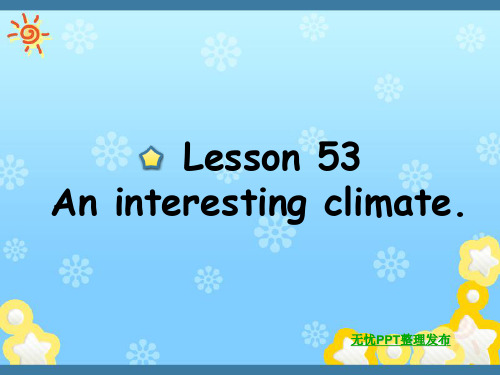
三、朗读课文判断正误
( ) It's windy in England.
( ) It's always warm in the North.
( ) Jim likes spring and summer.
( ) Jim doesn’t like autumn and
winter, because the sun rises late
无忧PPT整理发布
3. Which season do you like best? Why?
I like spring best. Because ... What’s your favourite season?
My favourite season is spring. Because ...
I’m from England. What nationality are you? I’m English.
无忧PPT整理发布
2. What’s the climate like in England?
(in your country) It’s …
What’s the weather like? It’s cold and windy.
say
说话的内容
speak 讲话的动作
talk
谈话,聊天
chat
聊天
dialog 对话—有固定的话题
conversation 谈话(随意的交流)
无忧PPT整理发布
二、句型及语法
1. Where do you come from?
I come from England. Where are you from?
无忧PPT整理发布
(完整版)新概念英语53课讲义

一、单词与短语mild: adj.温和的,温暖的;①adj.(天气等)温和的、温暖的;例句:We had a mild winter last yea r.去年我们度过了一个温暖的冬天。
②adj.(人性情等)温和的;例句:Tom is a mild man who never gets angry.汤姆性情温和从来不生气③adj.(食物等)味道淡的;例句:Try this mild soap.尝一下这味道清淡的汤。
always: adv.总是;always是一个常见的词也是一个经常考的词,关于always 这个词的考点需要掌握以下三点:①always与Sometimes、usually、regularly、often、every year、every week、every day等词及短语是一般现在时显著的标志。
②always有“一再、老是”的意思,这个词义在考试中也常考,它表示“对一种经常出现的情况或动作的一种厌烦情绪”如:He is always late for class:他上课总是迟到。
③关于always的一个常见的重点搭配形式:be always doing sth: 总是、、、它也表示“对一种经常出现的情况或动作的一种厌烦情绪”。
如:He is always asking silly questions.他总是问些愚蠢的问题。
方位的表达:east: n.东方;west: n.西方;south: n.南方;north: n.北方;补充:northeast东北;northwest西北;southeast东南;southwest 西南;另外在方位前一定要加定冠词the。
wet: adj.潮湿的;season: n.季节;best: adv.最;adj.最好的;n.最佳者,最好的东西;best这个词在英语中也是经常考的词,关于这个词在中学阶段应该重点掌握以下三点:①best 是形容词good和副词well的最高级形式表示“最好的”的意思。
新概念英语第一册53-54课件
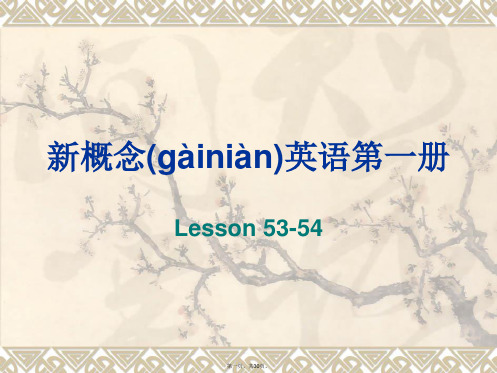
Lesson 53-54
第一页,共30页。
Lesson 53 An interesting climate
❖ mild adj. 温和(wēnhé)的,温暖的 [maild] ❖ always adv. 总是 ❖ north n. 北方 ❖ east n. 东方 ❖ wet adj. 潮湿的 ❖ west n. 西方 ❖ south n. 南方 ❖ season n. 季节
The days are long and the nights are short
The sun rises early and sets
late
第十八页,共30页。
I don't like autumn and winter.
The days are short and the nights are long
流) ❖ say:(说话的内容) ❖ speak:(讲话的动作) ❖ talk:(谈话,聊天) ❖ chat:(聊天) ❖ dialog:(对话—有固定的话题)
第九页,共30页。
❖ rise v.升起(shēnɡ qǐ) ❖ set v.落下去 ❖ sunrise n.日出 ❖ sunset n.日落
❖ 4 Jim comes from England.
Does Jim come from England?
❖
Jim doesn't come from England
第二十四页,共30页。
Lesson 54 What nationality are they?
Where do they come from?
The sun rises in the east.
新概念第一册53课课件

• 书面练习 • A Example: The sun rises early. Does the sun rise early? The sun doesn’t rise early. 仿照例子做句子(1,4)。
• 书面练习 • B • Example: he/Brazil Where does he come from? Is he Brazilian? Yes. He’s Brazilian. He come from Brazil. 仿照例句造句子(1,7)
Lesson 53 An interesting climate
有趣的天气
Text Paragraph 1
come from = be from It’s mild, but it’s not always pleasant. 此处的it指的是天气。 but “但是” ,连词,表转折 她喜欢春天,但她不喜欢冬天。 She likes spring, but she doesn’t like winter.
sun-rise n.日出 sun-set n.日落
Lesson 53 An interesting climate
有趣的天气
Text
Paragraph 4
certainly adv.当然,确实 It’s our favourite subject of our conversation. 天气是我们最喜欢谈论的话题。
Lesson 53 An interesting climate
有趣的天气
Text
1.Look at the pictures on page 105,and guess what they are doing. 2.Listen to the tape then answer this question. What is the favourite subject of conversation in England? 3.Listen to the tape again. 4.Read the text by groups and by paragraph.
新概念英语第二册Lesson 53深精讲解 Lesson 53 Hot snake

新概念英语第二册Lesson 53深精讲解 Lesson 53 Hot snake下面我们开始:一、深精讲解:课文标题:1. Hot snake触电的蛇标题中可以省略名词短语、皇冠形状的名称结构和冠词。
问题:2. What caused the fire?什么导致了火灾?本句是特殊疑问句.主谓宾结构,主语是疑问代词what,谓语动词caused,宾语是名词短语the fire.3.At last firemen have put out a big forest fire in California.消防队员终于扑灭了加州的一场森林大火。
本句是主谓宾状结构,主语是firemen,谓语have put out,宾语是a big forest fire,状语1是at last,状语2是in California.4.Since then, they have been trying to find out how the fire began.从那时起,他们一直试图找出火灾的原因。
这句是宾语从句,主句是主系表结构,主语they,谓语是have been,系动词的完成时态,表语是现在分词短语trying to find out,其中,动词不定式短语to find out是现在分词trying的逻辑宾语是。
宾从是主谓状结构,主语the fire,谓语began,状语1是how,状语2是since then.5.Forest fire are often caused by broken glass or by cigarette ends which people carelessly throw away.森林火灾通常是由碎玻璃或人们扔掉的烟头引起的。
本句是定语从句,主句是主系表状结构,主语forest fire,谓语动词are,表语是过去分词caused表完成,表被动.状语1是by broken glass,状语2是by cigarette ends.定语从句,主谓宾结构,主语people,谓语动词是throw away,宾语是which,状语是carelessly.6.Yesterday the firemen examined the ground carefully, but were not able to find any broken glass.昨天,消防队员仔细查看了地面,但没有发现碎玻璃。
新概念英语第二册课件Lesson53(共19张PPT)
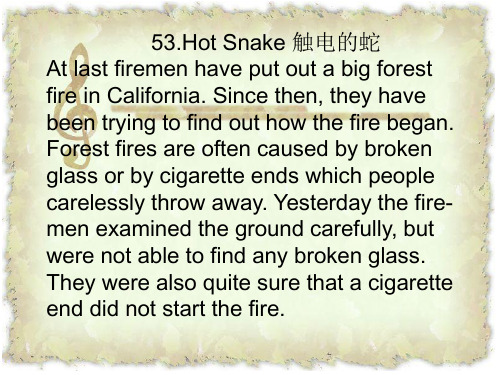
• ★remains n. 尸体,残骸 • dead body • corpse [kɔ:ps] • remain:遗迹;剩余物 • ★wire n. 电线 electric wire • ★volt n. 伏特(电压单位)
• ★power line 电力线
• ★solve v. 解决 • solve the mystery(迷) • solve the problem
• Forest fires are often caused by broken
glass or by cigarette ends which people
carelessly throw away. fires 复数,泛指许多火灾 broken glass碎玻璃 break glass 不可数 a glass 一个玻璃杯 glasses 眼镜
weight.
• find out 查明 • find out the truth
• 宾语从句
• be able to do 能够做某事 can • I am able to paly basketball/speak English.
in this way :以这种方式 只有以这种方式才能解决问题。 Only in this way can you solve this problem.
• ★mystery ['mistəri] n. 谜,神秘
• ★snatch v. 抓住 • snatch up 夺取,抓取
• ★spark n. 火花 • electric spark 电火花
Questions
• 1.What are forest fires often caused by? • 2.What caused the fire?
新概念第二册_lesson_53课件

辨析
• snatch 迅速而有力(粗鲁地)抓住,抢 (突然抓起 来)强调动作的突然性 • snatch a chance • grab 抓,抢,抢夺,抓住(热切而拼命地) • grab sth from sb/ grab sth from sth • grasp 1) 抓住或咬住,抓紧 • grasp a chance 抓住机会 • 2)掌握 grasp a language • hold 抓住,握住,托住 • seize v. 抓住(用力) seize my arm
现在完成进行时
•构成:have/has been+doing •含义:1)表示从过去某时开始一直持续到现在的 动作,并且还将持续下去。 2)表示在说话时刻之前到现在正在进行的动 作。 •与现在完成时的区别 •I have been writing a book.我一直在写一本书。 •(动作还将继续下去) •I have written a book.我已经写了一本书。 •(动作已经完成)
• -Why are you so tired? • I_________(paint) my house, and it will be finished till next week • I_________(cough) for two days, and I will see the doctor this afternoon. • He ___ ____(finish) his work for two days • 跟次数连用的, 一定只能用完成时, 不能用现在 完成进行时 • He has rung me up five times since 12 o’clock.
• hot news
最热点的新闻
• • • • • • • • •
- 1、下载文档前请自行甄别文档内容的完整性,平台不提供额外的编辑、内容补充、找答案等附加服务。
- 2、"仅部分预览"的文档,不可在线预览部分如存在完整性等问题,可反馈申请退款(可完整预览的文档不适用该条件!)。
- 3、如文档侵犯您的权益,请联系客服反馈,我们会尽快为您处理(人工客服工作时间:9:00-18:30)。
一、单词与短语mild: adj.温和的,温暖的;①adj.(天气等)温和的、温暖的;例句:We had a mild winter last yea r.去年我们度过了一个温暖的冬天。
②adj.(人性情等)温和的;例句:Tom is a mild man who never gets angry.汤姆性情温和从来不生气③adj.(食物等)味道淡的;例句:Try this mild soap.尝一下这味道清淡的汤。
always: adv.总是;always是一个常见的词也是一个经常考的词,关于always 这个词的考点需要掌握以下三点:①always与Sometimes、usually、regularly、often、every year、every week、every day等词及短语是一般现在时显著的标志。
②always有“一再、老是”的意思,这个词义在考试中也常考,它表示“对一种经常出现的情况或动作的一种厌烦情绪”如:He is always late for class:他上课总是迟到。
③关于always的一个常见的重点搭配形式:be always doing sth: 总是、、、它也表示“对一种经常出现的情况或动作的一种厌烦情绪”。
如:He is always asking silly questions.他总是问些愚蠢的问题。
方位的表达:east: n.东方;west: n.西方;south: n.南方;north: n.北方;补充:northeast东北;northwest西北;southeast东南;southwest 西南;另外在方位前一定要加定冠词the。
wet: adj.潮湿的;season: n.季节;best: adv.最;adj.最好的;n.最佳者,最好的东西;best这个词在英语中也是经常考的词,关于这个词在中学阶段应该重点掌握以下三点:①best 是形容词good和副词well的最高级形式表示“最好的”的意思。
例:what is the best way to solve the prolem?解决这个问题最好的方式是什么?②当best作副词的时候需要掌握一个重点短语:had best:最好,这个短语跟had better可以互换。
如:You had best do it again.你最好再做一次另一种表达方式:You had better do it again.你最好再做一次。
③另外两个在考试中常考的关于best的短语:Try one’s best:尽全力、、、例句:Try your best to get there early尽量早点到那儿去make the best of:充分利用;例句:Make the best of your time.充分利用你的时间night: n. 夜晚rise: v.升起early:adv.早get up early:早点起床set: v.太阳落下去,另外set还有放置、树立、引发、发动等等的意思,关于set考试中常考的短语有:①set off:启程,出发,动身;例句:We set off at dawn我们在黎明的时候动身②set up:建立、创立;例句:A new hospital has been set up in the city城市里新建了一座医院③set free:释放、放出例句:He was set free from the prison 3 days ago.他三天前从监狱里被放了出来late: adv.晚、迟,be late for class:上课迟到interesting: adj.有趣的、有意思的;subject:n.话题conversation:n.谈话have a conversation with sb:跟某人谈话二、课文中的短语句型语法(1)复习52课出现的短语及句型★come from 和be frombe from和come from都可以表示来自某地,二者意思相同,表示某人来自哪里的时候有两种表达方式:Where do you come from?和Where are you from? 注意两者在表达方式上的区别★what+be+主语+like即what…like句型。
What is the weather like...?天气怎样?What is the climate like...? 气候怎样?(2)本课需掌握的两个重点句型:★which+主语+do you like best表示:在所有的东西中最喜欢什么。
例句:Which seasons do you like best?你最喜欢哪些季节?Which books do you like best?你最喜欢看哪些书?★It is my favourite、、、这是我最喜欢的、、、例句:It is my favourite book这是我最喜欢的书It is my favourite football team.这是我最喜欢的足球队(3)需要重点掌握的两个词:rise 和raiserise 和raise是英语考试中常见的两个词一定要区分清楚:★rise: v.①表示日月等的上升例句:The sun rises in the east:太阳在东方升起②表示河水、物价、温度的上涨、上升与提高例句:The price is still rising:价格一直在上涨③起身、起床例句:The students rise early:学生们起床很早★raise:vt.①表示举起抬起例句:I can not raise this heave box.我举不起这个沉重的箱子②表示提高增加的意思例句:My salary was raised two weeks ago两星期前我工资涨了③表示饲养动物栽培农作物raise cattles:养牛raise wheat:种小麦rise 和raise 两个词作动词时最重要的区别是rise是不及物动词而raise是及物动词。
(4)需要掌握的一个重点表达方式In the North=in the north of England表示一个国家或地区的方位词如果单独使用一般要大写,特指某国或某地区的方位,但仅仅是表示方位意义的方位词则不要要大写,如a north wind;(5)需要重点掌握的语法:定冠词the 的用法定冠词the 用法口诀:1.有水无湖:海、洋、海湾、河等,都用the;单个湖不用the,(但多个湖用the);the Red Sea, the Pacific Ocean, the Persian Gulf, the Yangtze RiverThe Great Lakes(五大湖);Lake Erie(伊利湖)2.有球无星:地球,月亮用the;行星不用the: Mars,Venus;3.有山无峰:The Huangshan Mountains(黄山);Mount Everest(珠穆朗玛峰); Mount(or Mt.) Tai(泰山)4.有独无欧(偶):独一无二的,the earth,the moon,the sun 用the; 欧洲等七大洲不用the.Europe, Africa, Asia, North America, South America, Antarctica, Oceania5.有(足)族无球(运动):种族用the:the Indians(印第安人);球类运动:baseball, basketball6.有文无章:历史性的文件用the;小说等的章节不用theThe Constitution(宪法); chapter one7.学而不专:学校放在词组的前面时用the;专有名词放在词组的前面时不用the;The University of Fudan; Fudan University8、月份、季节要加the.Lesson 54 what nationality are they?where do they come from?一、单词与短语(1)Australia: n.澳大利亚→Astralian: n.澳大利亚人;adj.澳大利亚的、澳大利亚人的。
(2)Austria: n.奥地利→Austrian: n.奥地利人;adj.奥地利的、奥地利人的。
(3)Canada: n.加拿大→Canadian: n.加拿大人;adj.加拿大的、加拿大人的。
(4)Finland: n.芬兰→Finnish: n.芬兰人人;adj.芬兰的、芬兰人的。
(5)India : n.印度→Indian: n.印度人;adj.印度的、印度人的(6)Japan : n.日本→Japanese: n.日本人;adj.日本的、日本人的(7)Nigeria : n.尼日利亚→Nigerian: n.尼日利亚人;adj.尼日利亚的、尼日利亚人的(8)Turkey : n.土耳其→Turkish: n.土耳其人;adj.土耳其的、土耳其人的(9)Poland : n.波兰→Polish: n.波兰人;adj.波兰的、波兰人的(10)Thailand : n.泰国→Thai: n.泰国人;adj.泰国的、泰国人的(11)Korea : n.韩国→Korean: n.韩国人;adj.韩国的、韩国人的二、课文中的短语语法课文主要是对what nationality are they?和wheredo they come from?两个句型的复习与继续锻炼。
what nationality are they?其中的nationality是指国籍的意思,这句话的意思是,“他们是哪国人?”。
就国籍提问,回答时要用“哪国人”来作答。
where do they come from?“他们来自哪里?”,就具体地点提问,回答时要用“地点”来作答。
例句:what nationality are they?They are Chinese 或者是Their nationality is Chinese.where do they come from?They come from China.1、Thank you very much for taking me with you on that splendid outing to London. It was the first time that I had seen the Tower or any of the other famous sights. If I'd gone alone, I couldn't have seen nearly as much, because I wouldn't have known my way about.The weather was splendid on that day, which I thought was rare. I still remember some people told me that in Britain there was weather and no climate. During the same day, it might snow in the morning, rain at noon, shine in the afternoon and be windy before the night falls. So I think I was lucky。
